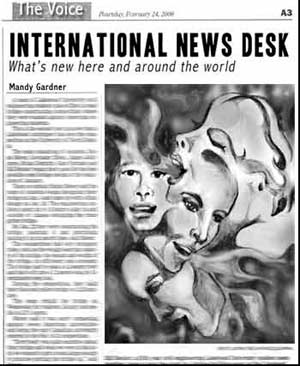 The Internet has been compared to the Wild West: an unfettered free-for-all whose rapid developments and opportunity for profit have hordes of people scrambling for a piece of the action.
The Internet has been compared to the Wild West: an unfettered free-for-all whose rapid developments and opportunity for profit have hordes of people scrambling for a piece of the action.
It’s a fairly apt description, and one that a group of content creators wants the Canadian Radio-television and Telecommunications Commission to change.
The coalition of 18 arts groups is demanding that the CRTC regulate the Internet to provide more Canadian content. They say that the Internet should be subject to the same Cancon rules as television and radio. They also want a share of the profits that Internet providers get when they transmit Canadian content.
The CRTC plans to hold public hearings on the issue in late 2008 (by which time there will have been even more developments in the medium), but as far as making the Internet play by television and radio standards, the issue is moot: It’s like trying to compare apples and oranges.
The key is in the very nature of the Internet. A major part of the CRTC’s mandate is to ensure that ?Canadian artists and Canadian stories [have] access to Canadian airwaves.? To apply that expectation to the Internet is impossible.
Why? First of all, because the content created for the Internet doesn’t need to be sold to Canadian airwaves, unlike programs that are purchased (or created) by licensed radio and television broadcasters. With a little bit of technological savvy, some inexpensive software, and a desire to express themselves, people can produce and broadcast their own original content, anything from photos to films to music.
Without a filter (i.e., a radio or television network) to sort through what is and isn’t considered Cancon?a highly subjective process in the first place?it just isn’t possible to monitor the billions of items of content available on the medium. It may be possible to do so for the material posted or broadcast by licensed radio and TV stations, but That’s just an extension of those networks? existing material. And a very small tip of the Internet iceberg.
Second, even if it was possible to legislate that Internet providers should become responsible for filtering the billions of data packets they transfer?essentially, searching everything posted through them to make sure it meets the Cancon quota?the logistics are mind-boggling. How would they determine which hits came from Canadian computers? Would the rules apply to Canadian-based websites whose main traffic came from people in, say, the U.S.? And with the constantly shifting nature of the Internet, how could anyone possibly monitor the situation with any accuracy?
The costs of such an undertaking would be astronomical and, as in any for-profit business model, passed on to the consumer. The monthly fees for the average Internet service would skyrocket and, in the end, defeat the purpose of the exercise. After all, if only a small percentage of Canadian households could afford the newly outpriced luxury of the net, who would all that Canadian content be seen by, anyway?
If Canadian artists really want to ensure that quality content reflective of their identity gets seen and appreciated, they’re better off to embrace the very qualities of the Internet they’re trying to control: use the unfettered boundaries of the net to share their uniquely Canadian vision with an audience unimagined by artists just a decade ago.


